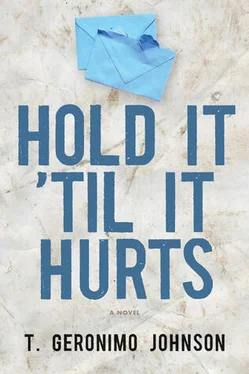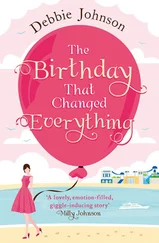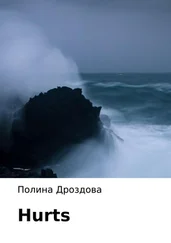But he didn’t say any of that. He stared blindly and swallowed often, even though his mouth was so dry each contraction was like forcing a sharp chunk of burning granite down his throat. But he had to say something, so he said to Lamont, “Remember how you told me that your mom used to put jelly between your pancakes and still let you put syrup on top?” And he held Lamont Jackson’s hand, and the tighter Jackson squeezed, the tighter Achilles squeezed. And he said, “You know how you told me that your lady’s dog used to get upset when you spent the night, and would piss in the hallway, and you won’t be mad about it when you go home?” Jackson grinned widely. “Jealous devil. My Jody’s a dog.” The grin faded and he said, “Don’t leave me.” He tried to speak again, but no more came out, and an Afghan kid in the background was laughing and Jackson squeezed Achilles’s hand tighter and Achilles squeezed back and felt the sun biting his neck, the sand in his mouth, in his socks, his ears, it was like there was sand every-fucking-where, even in his goggles, there was even sand in his ass, and it was so fucking hot he was gonna shit glass, and the kneepad straps pinching his knees, and helmet strap slicing his Adam’s apple, and his belt cutting his waist, and his pistol butt digging into his ribs, and it felt like everything that was supposed to be protecting him was choking him to death, and he said to Jackson, “Know how you say, ‘When we get back to the barracks and drop this shit off, it feels like we can fly’?” And Lamont nodded and went still, but his grip grew so tight Achilles was a long time freeing himself.
And after the perimeter was secure, when they reassembled in the silence of the aftershock — Wages calmly directing with his hands; the laughing Afghan kid defiant to the end, smiling even as he dropped to the ground clutching his neck, knees to the dirt in a soft puff of dust; Merriweather with blood on his fingers and a glazed look in his eyes, putting the blade away wet, as casually as zipping up; Wexler leaning against the burned-out hulk, sobbing, spitting on Merriweather — Achilles looked at Troy, who had switched seats with Jackson, and was just so glad that they were alive, and the sun was dead behind Troy’s head like a halo, so Achilles couldn’t see his face, and he was so happy Jackson had switched seats with Troy, and that whole fucking thing drove him fucking crazy, the whole thing, the idea that somehow by Troy being there it was impossible for Achilles to really give a fuck about anybody else in the squad, because it was like there was a tax and someone always had to pay it, and as long as it wasn’t Achilles or Troy it was okay, and he knew he shouldn’t feel that way, he knew he should want them all to make it out, but he knew they couldn’t, he knew, somehow, in a way he couldn’t explain, because he’d never believed in ESP or clairvoyance, but he knew that of the eight that started, only four would survive, and no matter what happened at each formation of prayer group, he could never muster the words Let’s do it or We got this or We put the fun in funeral. He could only say, “That’s right.” And that was the look he must have worn as a mask while Jackson died, a tense smile that said, It’s as bad as it looks, and it probably feels even worse, but at least it’s you and not us. And in the soup kitchens it was the same, and he realized that as a kid it had been the same, that if he’d asked his teachers or his friends or his neighbors, “Am I going to make it?” They would have said, “You’ll be fine as long as you never, ever, ever leave home, because here we all know you and treat you like one of us.” Maybe that was the look the neighbors had had at his eighth birthday party. Had they already known about Troy that day? That thought burned him like no other. He could never show his face in Maryland again. Pity was fatal.
And it was pity Jackson had shown. Oh how Achilles burned as they trundled off with Jackson strapped to the roof, baking like a fucking potato, someone screaming for Wexler to shut his whiny vaginy, Merriweather murmuring “We don’t get down, we get even,” and Troy chastising Achilles for breaking protocol to stay with Jackson instead of pushing into a defensive position, whispering, “Asshole! You could have been shot. For fuck’s sake, Keelies, don’t start trying to be a hero.”
With each passing day he wondered how to tell Ines, knowing this deceit amounted to infidelity. He would be branded, and Ines would be forced to wonder: if ever their lives diverged, was she also in danger of being psychically killed off, of being denied the emotional afterlife deserved by all those with whom one once shared a bond of affection — thumbed photos, the random wistful sigh, the occasional mention. She would have to ask, If you could kill your family, where does that leave me? God, would she be upset. When Achilles told her that his mother had died, Ines cried so hard you would have thought she knew Anna, and she never forgave herself for being out of the country when it “happened.”
He hadn’t planned it this way. He’d only wanted to protect their relationship from the bad luck haunting him like a phantom limb. Everybody liked freaky white girls, and he couldn’t be blamed for having been turned on by the dreads and dashiki. He couldn’t be expected to walk up to a woman and say, “Hi, I’m Achilles. I was adopted by white parents because mine didn’t want me and my brother’s missing.” He had often asked himself what he would have done differently had he known Ines was black, or at least had black relations . He had just as often answered, Nothing , even though he had been quick to tell Naomi under the cover of night, in a raspy murmur, wondering if he would die before knowing who he really was, and afterwards swearing her to secrecy.
Besides, if he didn’t find Troy, he would have to bear Ines constantly asking, “Have you heard from your brother?” Even if he could persuade her not to ask that directly, he would still see the question reflected in her eyes during family gatherings, in church, and whenever one of them received the piece of king cake with the baby in it.
Wages would understand, but he called Wages less and saw Ines more, until his life was riven into the old friends who would never know who he had become and the new friends who would never know who he was. Everyone, truly everyone — his mother included — had tacitly agreed to stop mentioning Troy on the phone except for the brief awkward pause at the beginning of calls when each waited to hear if the other had news. The less he spoke to old friends, the better he felt, until some days he could believe that normal was all he’d ever known. He had always clerked at Boudreaux’s firm. He had always eaten boudin with breakfast, and spent Saturday mornings seated on the carpeted floor leaning back on the sofa, reading the comics aloud while Ines rested her legs on his shoulders. He had never been given up for adoption or gone to war.
Not that he wasn’t proud of serving his country, it was just that no one else cared. Iraqi and Afghanistan vets weren’t spat upon like Vietnam vets, but they certainly weren’t greeted with ticker tape parades. He’d seen a commercial where returning soldiers were applauded as they walked through an airport. What a joke.
Vets didn’t exist. It wasn’t as much a war as a campaign issue, a mere budgetary concern, and if so many had died, and continued to die, it was only because no one had accurately forecasted the ultimate cost. The nonwar had continued so long without him it didn’t seem like the same war. But he knew it was the same war, officially or not, “Mission Accomplished” or not, whenever he spoke with recently returned vets. They understood that after digging out of the dirt overturned by mortars, the sand in your mouth tasted like sugar. He refused to discuss Afghanistan with anyone else, especially the voyeurs. There were the morbidly inquisitive, people who thought they could comprehend, secondhand, how death trumps reason, as if they could understand how often the dead appear to be grinning, or that if you stare too long a dead friend looks more and more like a stranger, while a dead stranger looks increasingly like a long-lost friend. There were the gung-ho civilians who couldn’t point out Kabul on a map, but swore that if it wasn’t for fallen arches or tennis elbow, they would zip right over there and singlehandedly cap every towel head. (When he wasn’t around, did they say sand zigger?)
Читать дальше












